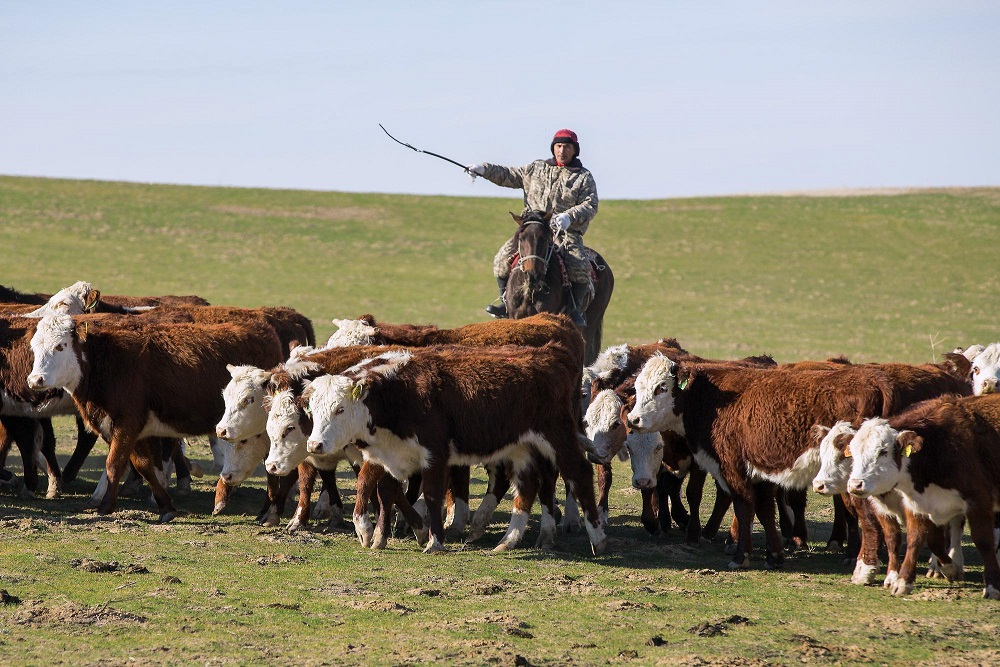Kazakhstan is stepping up economic cooperation with China, through a $1 billion trade and investment deal meant to pump more money into the Caspian region and Central Asian state that has become a scientific and geopolitical focal point in the past year.
On Tuesday, Kazakhstan’s Deputy Prime Minister and Minister of Agriculture Askar Myrzakhmetov paid a one-day visit to Beijing to meet with his Chinese counterpart, Han Changfu, as well as the chairman of China’s General Administration of Quality Supervision, Inspection and Quarantine, Zhi Shuping.
Accompanied by Kazakhstani entrepreneurs, Myrzakhmetov also met with representatives from China’s largest companies, including CITIC Construction, State Development and Investment Corporation, Dalian Commodity Exchange and Grand China Business Management Co. Ltd., to discuss possible ways of investing in Kazakhstan’s agricultural sector, including organic farming.
Astana and Beijing are also looking to boost investments in Kazakhstan’s construction sector. Following the Tuesday’s meetings also include a memorandum to launch a $600 million investment program that will cover 2018-2024.
A $600 million six-year program, covering 2018-2024, agreed to between Kazakhstan’s Meat Union and China’s CITIC Construction will see specialized infrastructure built in Kazakhstan to manufacture and export cattle and beef to China.
“I hope that in the next 5-7 years this will give a great impetus to the development of small and medium-sized farming in Kazakhstan, because with the availability of guaranteed sales and a good price, more people in our country will be engaged in livestock breeding,” said Maksut Baktimbayev, the head at the Kazakhstan’s Meat Union.
An agro-industrial complex will be built in South Kazakhstan province, at the tune of about $100 million, to launch a wheat farm, worth an additional $100 million, to create a network of wholesale distribution centers and provide commodity exchange platforms.
Following two documents agreed to by Kazakhstan’s Food Contract Corporation and Grand China Business Management Co. Ltd., Beijing is to import 20,000 tons of wheat worth of $4.5 million and 2,000 tons of vegetable oil ($1.5 million) from Kazakhstan.
Trade between the two neighboring countries was worth almost $8 billion in 2016, with Kazakhstani exports worth $3.6 billion and imports $4.2 billion, according to Kazakhstan’s Statistics Committee.
China’s direct investments in Kazakhstan over the past ten years amounted to around $13 billion, making it one of the Kazakhstan’s top five largest investors, according to Borisbiy Zhanguzarov, the chairman at KAZNEX Invest.
Beijing’s investments in Kazakhstan involve more than 2,700 different enterprises, ranging from oil and natural gas sectors, to logistics, machinery and agribusiness.
Chinese agricultural companies currently operating in Kazakhstan include Rifa Holding Group, which manufactures equipment; CITIC Construction and COFCO, China National Cereals, Oils and Foodstuffs Corporation, which is one of China’s state-owned food processing holding companies.
Chinese interest in the Caspian region’s third largest economy is nothing new. While China is ranked amongst the world’s largest economies, worth about $11 trillion, it possesses very small amounts of lands suitable for cultivation, presenting Beijing with a problem of how to feed its population of over one billion.
“We believe that cooperation between China and Kazakhstan in the realm of agriculture is mutually complementary, because we have production facilities, while you have the areas and the potential to increase the production of agricultural products,” said Zhang Hanhui, the Chinese Ambassador to Kazakhstan.
As the third largest agricultural producer in the Commonwealth of Independent States (CIS) region, after Russia and Ukraine, Kazakhstan has 20 million hectares (49 million acres) of land suitable for farming, out of a total area of about one million square miles. Kazakhstan fully feeds itself with its wheat production, and exports at least 70 percent of the crop even in the leanest of years.
The north part of Kazakhstan is known for growing spring wheat, oats, barley, sunflower and fly-curls, while the western part is famous for its corn, vegetables and sunflowers. Kazakhstan’s southern regions grow cotton crops, sugar beets, tobacco and rice. Livestock farmers throughout the country are mostly engaged in the breeding of sheep, horses, camels and cattle.
Given the country’s agricultural bounties and business potential, Astana has been working hard to strengthen Kazakhstan’s agribusiness through a series of legislative reforms.
In 2013, the government launched Agribusiness 2020 Program, aimed at making investment in Kazakhstan’s agricultural sector less risky. The program is meant to increase the potential for recovery of investments, increase the affordability of products, works and services for agro-industrial sector entities, and improve the overall business atmosphere for investing.
In 2015, Kazakhstan entered into the World Trade Organization, offering foreign investors easier access to its land, financial incentives, and opportunities for privatizing some of its state-owned enterprises.
Astana also provides financial support to the agricultural sector. The state-run KazAgro National Management Holding acts as an infrastructure investor and a source of financing for agricultural producers who need long-term commitments and lending.







 President Ilham Aliyev recently inaugurated the first phase of reconstruction in the newly repopulated village of Sarijali in Azerbaijan’s liberate...
President Ilham Aliyev recently inaugurated the first phase of reconstruction in the newly repopulated village of Sarijali in Azerbaijan’s liberate...
 Nine years have passed since a bloody escalation of the Armenia-Azerbaijan conflict that was later dubbed the April War or Four Day War.
Nine years have passed since a bloody escalation of the Armenia-Azerbaijan conflict that was later dubbed the April War or Four Day War.
 Iranian Foreign Minister Abbas Araghchi has urged the International Atomic Energy Agency (IAEA) to take a "transparent position" regarding potentia...
Iranian Foreign Minister Abbas Araghchi has urged the International Atomic Energy Agency (IAEA) to take a "transparent position" regarding potentia...



